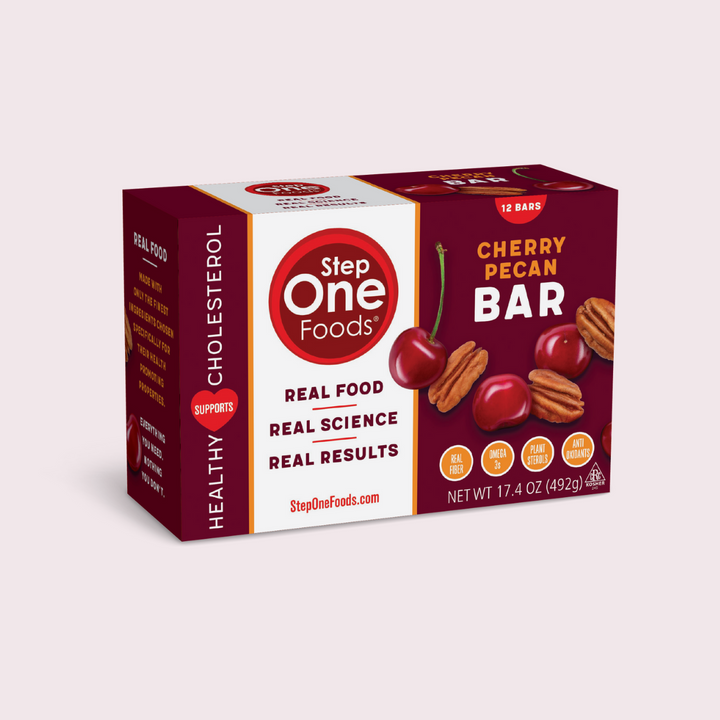Enough with the sugar!

We’ve probably all heard the saying: “An apple a day keeps the doctor away.” So, when it comes to eating for heart health, would you consider an apple to be off limits? How about a cup of blueberries? Well, did you know that a medium sized apple has about 19 grams of sugar? Or that a cup of blueberries is not far behind at 15 grams?
The sad fact is that if you were to just see the Nutrition Facts Panel (NFP) of an apple or some blueberries, without knowing what the label was attached to, you might reject those foods outright based on that one property alone. Even though that would be incredibly foolish - as the data is vast and consistent that eating plenty of fruits and vegetables is foundational to preventing heart disease… and cancer… and dementia.
Yet, there is probably not a week that goes by that a potential customer looks at the NFP on one of our products and comments on the sugar content. 16 grams (!) for the Apple Cinnamon Bar, 15 grams (!) for Cherry Pecan Bar, 12 grams (!) for Dark Chocolate Walnut Bar. And every time that happens, I throw my arms up in exasperation. Because sugar content has to be one of the lousiest ways to judge a food’s quality or health impact.
There are all sorts of sugars and sweeteners and the NFP does a really poor job of distinguishing among them – or even accounting for all of them. The only information provided is total sugar and added sugar – with little data on where the sugars and sweet taste came from.
Quiz: Which of these added sugars is best for you: barley malt, cane juice crystals, crystalline fructose, galactose, malt powder, carob syrup, golden syrup, high-fructose corn syrup, honey, agave nectar, malt syrup, maple syrup, oat syrup, rice bran syrup, or brown rice syrup?
The answer is surprisingly straightforward. None of the above! Sure, brown rice syrup sounds a lot healthier than high-fructose corn syrup while honey is completely natural but, at their core, all of these are just simple sugars composed of two molecules (glucose and fructose) in various proportions. They are digested easily, absorbed quickly, cause insulin spikes and, as a result, fuel things like progressive insulin resistance (read diabetes and prediabetes), abnormal cholesterol levels, and inflammation.
That’s why the World Health Organization advises that adults eat no more than 40 to 50 grams of added sugar per day.
Back to Step One bars: 0 grams added sugar for Apple Cinnamon, 0 grams added sugar for Cherry Pecan, and 3 grams added sugar for Dark Chocolate Walnut – the added sugar coming primarily from the dark 72% cacao chocolate itself (which would be completely unpalatable without the relatively small amount of added sugar that’s in there - and which has been extensively studied and shown to have health promoting properties regardless). That means that the vast majority of the sugar in our foods comes from WHOLE FRUIT (like whole apples and cherries and dates). I come back to my original question – would you consider whole apples, cherries or dates to be bad for you? Of course not.
But here’s another important point – the sugar content and flavor of Step One bars comes without any hidden sweeteners of any kind – so no maltodextrin, sucralose, xylitol, erythritol or isomalt. And why is that important? Because those sweeteners are known to be counterproductive to health. But since they’re “non-nutritive” (supplying no calories), they don’t need to show up anywhere on the NFP.
So, buyer beware! You can have an item that tastes sweet but has no sugar listed on its NFP. In fact, such an item will often boast about its low sugar content on the front of the package. However, that does NOT automatically make it a safe item! In fact, it could be MUCH worse in terms of health impact than a normally sweetened version of the same thing.
Back to my exasperation. This should NOT BE SO COMPLICATED!!! But it is - and it leads a lot of people astray by focusing them on the wrong thing. Which is why I personally ignore the sugar line on all NFPs. Instead, I look at the ingredient list and put the item back if I see a bunch of individually listed sweeteners, sugars and/or syrups. (Unlike other food manufacturers, we’ve always been transparent about the sugars in our products at Step One Foods.) Because what’s most important is ingredient quality. And at Step One Foods we take that very seriously.
The only sugar that can be considered healthy? The sugar that’s naturally present in whole fruits and vegetables. Once again, nature is brilliant and no food company has been able to out-package it. A piece of whole fruit delivers its intrinsic sugar content as part of a complex package with just the right amount of natural fiber to slow down digestion and sugar absorption, as well as boatloads of just the right antioxidants, phytochemicals, interesting vitamins and minerals – that all work together in just the right combination to create better health – from supporting a healthy gut microbiome to lowering cholesterol to helping turn off cancer signals.
An apple (or an Apple Cinnamon Step One Foods bar) a day, most definitely helps keep the doctor away.

Try our Newest Bar!
Cherry Pecan Bar
Discover the perfect harmony of cherries and pecans in our Cherry Pecan Bar. Montmorency cherries, renowned for their antioxidant and anti-inflammatory properties, are combined with premium pecans to create a delicious blend of sweet, tart, and nutty flavors. Packed with white chia seeds, flax, and walnuts, this bar offers more than just taste—it's a superfood-filled snacking option. Our Cherry Pecan Bar is the perfect choice, whether you're on the go or seeking a nourishing treat.
Get heart health tips and articles like this, delivered right to your email.
New articles every week.
You may also like...

You don’t need to avoid foods with cholesterol…except for these




